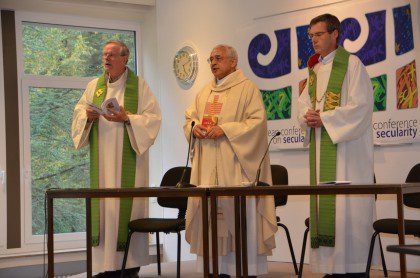
Homily from the opening Mass of the European Conference on Secularity
In his Gospel Luke is the only one who tells the story of the mission of the 70 – or as some traditions say, 72 – disciples. It is interesting that this periscope of the Gospel was chosen for today’s liturgy. It sets Luke apart from the other two synoptic writers who have only a mission of the twelve. With the number 70 or 72 the Gospel makes reference to the table of the nations in Chapter 10 of the Book of Genesis. Luke is clearer than the others that the mission of Jesus was addressed to the nations and not only to Israel. In this way Luke is the companion of Paul, the great apostle to the Gentiles. We are the beneficiaries of this Lucan tradition: From him we have inherited Christ; we have inherited this European Christ.
We, the European Dehonians, have come to Clairefontaine to reflect on Christ in Europe and on our mission in Europe. We find ourselves in an anomalous situation. We love both Christ and this idea we call Europe. In many ways we find ourselves to be children of European culture. And we admit it, we are proud of its heritage. We proclaim to the world Europe’s artistic and intellectual achievements. We hold out to the world Europe’s way of life as more intensely human, more cultural, than that of other continents. We are proud of Europe’s achievements in human rights and of its concern for the well-being of the earth. Also, we have an attachment to Europe’s concept and vision of the human self – the concept of ourselves as an individual – and we realize that we have given ourselves, perhaps a bit too wholeheartedly, to this self as an individual.
But we know that this European gift has also its shadow side. At this conference of Europa we want to become more aware of what this new awareness of ourselves has done to our soul. In many of our countries, if not in all, it has led to a clash of civilizations – not the clash foreseen by Samuel Huntington – the clash with Islam, but a clash internal to the original European cultures. Until recently – in point of time, until the early 1990s – many of us thought that these two visions of Europe could live in some tensional harmony. But a number of acute ethical issues, but also political and lately economic issues, have made us aware that the “convivance” of the Christian and the secular is becoming more and more difficult. For us the clash forced itself into our awareness through a lack of new vocations, in the aging of our membership, in the perspective of our possible demise in Europe. In the pastoral field we see it in the drastic shifts of perspective among the baptized. For many it has led to a crisis of faith and a crisis of belonging. We know also that this crisis of the two Europes is no longer outside of our Dehonian communities; it is woven right into the core of our lives together. We are here to ask what we should be doing at this juncture of European history.
And so the reading of Luke’s Gospel today brings us back to Luke’s original intent. Luke brings us back to our source: Jesus, who first gave us the gospel of the kingdom of God, who first spoke to us the new language of God, who initiated what we call the new testament, or even more so, the Gospel, the good news. Can we mediate, as once did Luke, this word spoken in the scriptures with what Europeans are living now? We can perhaps learn from him. He inserted the Gospel into European culture, not as something totally alien, but as a culture where God’s Holy Spirit was present, as Nostra Aetate, the great Conciliar document of Vatican II, says, as “a ray”, and “the seed of the Word” that must be uncovered.
I believe this to be an important moment in the life of the Congregation in Europe. If in Asia the Congregation has decided to engage more intently as Asians in the threefold dialogue with the poor, with other religions and with Asian cultures, we in Europe may well chose to become more actively engaged in the dialogue with our European culture and to confront its challenge of authenticity and its search for meaning. This conference asks how we might do this?
We pray that the Lord whom Luke saw so much in the poor and in the sick may guide us in our search for him. We also ask the help and inspiration of Fr. Dehon, who in the 19th century displayed a great passion for those who lived at the fringes of European life, the outcasts of the Industrial Revolution. He leaves it to us to work with the new victims of Europe who are no longer perhaps only the economic and social victims, but also its spiritual victims. May this Eucharist be plea that those who have become the strangers may once again experience the invitation to be – to use an Italian word – commensali, companions at the table of the Lord. But that may be possible only, if both the strangers and the present commensali find each other again.
